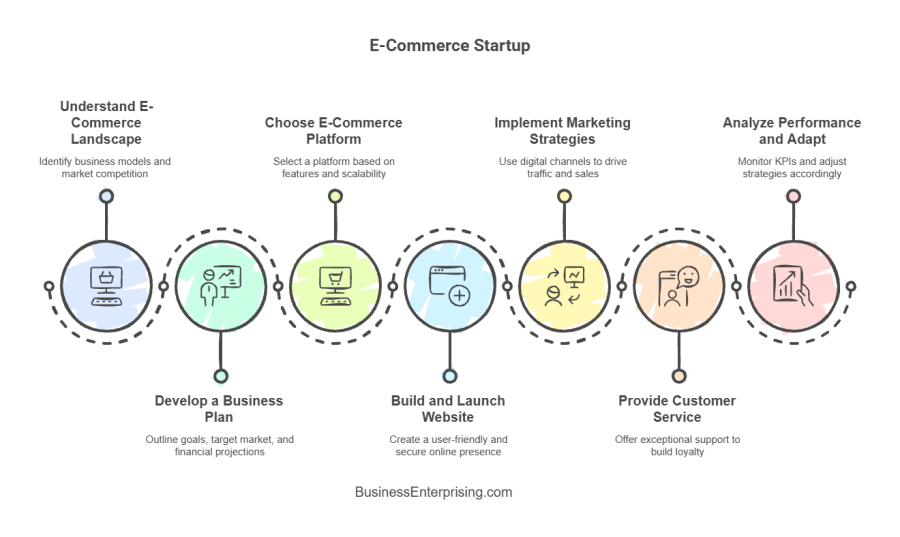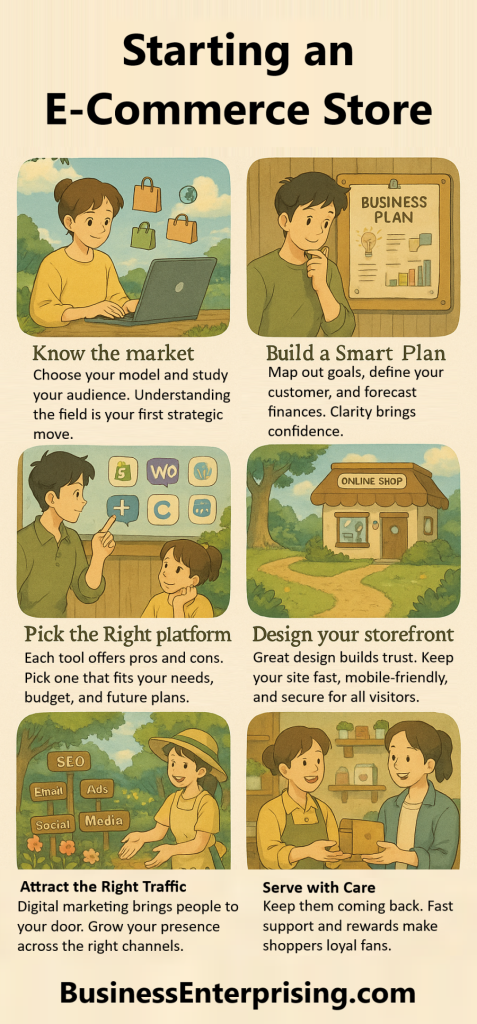 Starting an e-commerce business has become an increasingly attractive venture for entrepreneurs due to the rapid growth of online shopping and advancements in digital technologies. The e-commerce industry offers vast opportunities for those willing to navigate its complexities and capitalize on its potential. However, launching a successful e-commerce business requires careful planning, strategic execution, and a deep understanding of the market. This article provides a comprehensive guide to starting an e-commerce business, highlighting key considerations and steps to ensure long-term success.
Starting an e-commerce business has become an increasingly attractive venture for entrepreneurs due to the rapid growth of online shopping and advancements in digital technologies. The e-commerce industry offers vast opportunities for those willing to navigate its complexities and capitalize on its potential. However, launching a successful e-commerce business requires careful planning, strategic execution, and a deep understanding of the market. This article provides a comprehensive guide to starting an e-commerce business, highlighting key considerations and steps to ensure long-term success.
Understanding the E-Commerce Landscape
Before diving into the specifics of starting an e-commerce business, it is essential to understand the broader landscape. E-commerce encompasses various business models, including business-to-consumer (B2C), business-to-business (B2B), consumer-to-consumer (C2C), and consumer-to-business (C2B). Each model presents unique opportunities and challenges, so it’s crucial to identify which one aligns with your business goals and target audience.
The e-commerce market is highly competitive, with numerous established players and new entrants vying for consumer attention. To succeed, you must offer a unique value proposition that differentiates your business from the competition. This could be through unique products, exceptional customer service, or innovative marketing strategies. Conducting thorough market research is vital to understand consumer preferences, identify trends, and analyze competitors. This research will inform your business strategy and help you make data-driven decisions.
Developing a Business Plan
A well-structured business plan is the foundation of any successful e-commerce venture. Your business plan should outline your goals, target market, competitive analysis, marketing strategy, and financial projections. Clearly defining your business objectives and strategies will provide a roadmap for your journey and help you stay focused.
One of the critical components of your business plan is identifying your target market. Understanding who your customers are, their needs, and their buying behavior will enable you to tailor your offerings and marketing efforts effectively. Conducting surveys, analyzing online behavior, and studying industry reports can provide valuable insights into your target audience.
Financial planning is another crucial aspect of your business plan. Estimate your startup costs, including website development, inventory, marketing, and operational expenses. Additionally, project your revenue streams and break-even point to ensure your business is financially viable. Having a clear financial plan will also be essential when seeking funding from investors or financial institutions.
Choosing the Right E-Commerce Platform
Selecting the right e-commerce platform is a critical decision that can significantly impact your business’s success. Various platforms are available, each with its features, pricing, and scalability options. Popular e-commerce platforms include Shopify, WooCommerce, BigCommerce, and Magento. When choosing a platform, consider factors such as ease of use, customization options, payment gateways, and customer support.
Your e-commerce platform should provide a seamless shopping experience for your customers. Ensure that the platform you choose offers responsive design, fast loading times, and secure payment processing. Additionally, look for features that enhance the customer experience, such as personalized recommendations, easy navigation, and efficient checkout processes.
Building and Launching Your Website
Your website is the face of your e-commerce business and plays a crucial role in attracting and retaining customers. Invest in professional web design to create a visually appealing and user-friendly website. Your website should reflect your brand identity and provide a cohesive experience across all touchpoints.
Content is king in the digital world, so ensure your website has high-quality content that engages and informs your audience. Product descriptions should be detailed and persuasive, highlighting the unique features and benefits of your products. Incorporate high-quality images and videos to showcase your products effectively. Additionally, optimize your website for search engines by using relevant keywords, meta tags, and alt texts. Search engine optimization (SEO) will improve your website’s visibility and drive organic traffic.
Security is paramount in e-commerce, as customers need to trust that their personal and financial information is protected. Implement robust security measures such as SSL certificates, secure payment gateways, and data encryption. Additionally, ensure your website complies with data protection regulations such as GDPR and CCPA.
Marketing and Driving Traffic
Once your website is live, the next step is to attract visitors and convert them into customers. A comprehensive marketing strategy is essential to drive traffic and generate sales. Digital marketing channels such as social media, email marketing, search engine marketing (SEM), and content marketing can be highly effective in reaching your target audience.
Social media platforms such as Facebook, Instagram, and Pinterest offer powerful tools for promoting your products and engaging with your audience. Create compelling content that resonates with your followers and encourages them to share and interact with your brand. Influencer marketing can also be a valuable strategy, leveraging the reach and credibility of influencers to promote your products.
Email marketing remains one of the most effective channels for driving sales and building customer loyalty. Collect email addresses through sign-up forms on your website and send targeted campaigns that offer value to your subscribers. Personalized emails with product recommendations, exclusive offers, and engaging content can significantly boost your conversion rates.
Paid advertising through search engines and social media platforms can provide immediate visibility and drive targeted traffic to your website. Utilize tools such as Google Ads and Facebook Ads to create targeted campaigns based on demographics, interests, and online behavior. Continuously monitor and optimize your campaigns to maximize your return on investment.
Providing Exceptional Customer Service
Customer service is a critical differentiator in the competitive e-commerce landscape. Providing exceptional customer service can build trust, encourage repeat purchases, and generate positive word-of-mouth. Offer multiple channels for customer support, including live chat, email, and phone. Respond promptly to inquiries and resolve issues efficiently to ensure a positive customer experience.
Implementing a customer loyalty program can also enhance customer retention. Reward your loyal customers with exclusive discounts, early access to new products, and personalized offers. A well-executed loyalty program can turn satisfied customers into brand advocates who promote your business to others.
Analyzing Performance and Adapting
The e-commerce landscape is dynamic, and businesses must continuously adapt to changing market conditions and consumer preferences. Regularly analyze your business performance using analytics tools to gain insights into your website traffic, sales, and customer behavior. Identify areas for improvement and implement data-driven strategies to enhance your operations and marketing efforts.
Monitor key performance indicators (KPIs) such as conversion rates, average order value, customer acquisition cost, and customer lifetime value. These metrics will provide a clear picture of your business’s health and guide your decision-making process. Additionally, stay informed about industry trends and emerging technologies to stay ahead of the competition.
Conclusion
Starting an e-commerce business is a multifaceted endeavor that requires careful planning, strategic execution, and continuous adaptation. By understanding the e-commerce landscape, developing a comprehensive business plan, choosing the right platform, building a user-friendly website, implementing effective marketing strategies, and providing exceptional customer service, you can set your business up for success. As the digital landscape evolves, staying informed and agile will be crucial to maintaining a competitive edge and achieving long-term growth. With dedication and the right approach, your e-commerce venture can thrive in this dynamic and rapidly expanding market.


